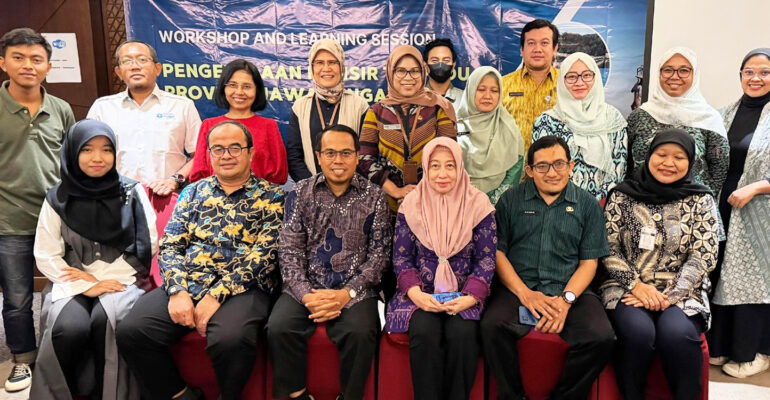PKSPL IPB University Together with Central Java Bappeda and FOCUS Consortium Prepare Integrated Coastal Management Masterplan

Recently, the Center for Coastal and Marine Resources Studies (PKSPL) IPB University together with the Regional Development Planning Agency (Bappeda) of Central Java Province (Central Java) held a learning session on Integrated Coastal Management.
The learning session was held with consortium partners of the Fisherfolk Empowerment for Climate Resilience and Sustainability (FOCUS) Program consisting of the Humanist Foundation, the People’s Coalition for Fisheries Justice (KIARA), and the Central Java Regional Indonesian Forum for the Environment (WALHI).
The learning session was held for two days and attended by 35 participants. The participants consisted of representatives of the FOCUS consortium, Central Java Provincial Government agencies, academics from the Integrated Coastal Zone Management (ICZM) Center Diponegoro University (Undip), Soegijapranata Catholic University, as well as resource persons from PKSPL IPB University and Bappeda Tangerang Regency.
Prof Yonvitner, Chief of PKSPL IPB University and President of PNLC or Partnerships in Environmental Management for the Seas of East Asia (PEMSEA) emphasized that efforts to transform slum, unorganized, and polluted coasts are very possible.
“Taking the example of Xiamen City, China, pioneering efforts were made since 1996 when the coastal area of Xiamen City was a chaotic and environmentally distressed area,” he said when delivering a statement at Louis Kienne Pandanaran Hotel, Semarang City.
However, he continued, through Integrated Coastal Management (ICM) planning and implementation as well as long-term commitment, Xiamen currently became a modern coastal city with good environmental quality and a prosperous place for its residents.
Meanwhile, Endro Catur Nugroho from the Humanist Foundation revealed that this learning session is the consortium’s effort to support the government in managing Central Java’s coastal areas which are increasingly under pressure due to anthropogenic activities and climate change impacts.
“The FOCUS Consortium welcomes the Central Java Bappeda’s plan to encourage all regencies and cities on the coast to prepare coastal management plans so that they are given more attention and become regional development priorities,” added Endro.
Furthermore, Ahmad Farhan from Bappeda Tangerang District explained how a coastal district can take a role in managing its coast without having to compete in authority with the province.
“Through environmental rehabilitation efforts, the Tangerang District Government is slowly trying to reorganize its environment even though it has to face a big challenge with the spread of privatization in coastal areas,” Farhan said.
He continued, “Political will from local leaders, cross-sector teamwork, and pentahelix collaboration with various actors are the keys to Tangerang’s coastal transformation,” he explained.
Learning from other locations in implementing ICM is a valuable input for Central Java Province to do the same. It should be noted that the coastal areas of northern Central Java are downstream of various problems that require immediate handling. The threat of abrasion, rob, seawater intrusion, loss of income sources, and settlement areas must be addressed immediately.
On the other hand, coastal Central Java is also an important economic, industrial, and transportation artery in Java. Therefore, integration between actors is key, as well as integration between the provincial and district governments and the center.
“Provincial authority is the key to ensuring integration, but the real work in handling the environment and humans lies in the district. Therefore, Bappeda encourages and assists districts and cities to prepare master plans or coastal management action plans so that important and urgent issues in coastal Central Java become a priority in development planning,” said Nathan Setyawan from the Central Java Provincial Bappeda.
The existence of master plans in districts and cities will help the province to bridge communication with many parties regarding important and crucial issues in each region and monitor the development of each region, continued Nathan.
Actually, the ICM concept has been built at the Central Java regional level with the ICZM concept initiated by Undip Semarang. Nomastuti Junita Dewi from the Center for ICZM UNDIP said that Central Java Province has had an ICZM acceleration team since 2021. However, there is no comprehensive and legally enforceable planning document to direct every handling of coastal issues.
“So far, each issue has been responded to and implemented by each party, both at the regional and central levels. There is no effort to synchronize strategies or actions, so it seems that the handling is sectoral and alone. This is a weakness that must be closed at the provincial level. Learning and partnerships with institutions such as PEMSEA in East Asia will be valuable for Central Java Province,” said Nomastuti.
At the end of the learning session, participants felt the need to formulate a coastal management master plan format to be implemented at the district and city levels. This master plan adopts the ICM approach and framework developed by PEMSEA and PKSPL IPB University based on learning in other locations.
The master plan to be developed by coastal districts and cities consists of Regional Planning Documents such as the Regional Long-Term Development Plan (RPJPD), Regional Medium-Term Development Plan (RPJMD), Regional Government Work Plan (RKPD), and Regional Work Unit Strategic Plan (Renstra OPD).
These Regional Planning Documents will be combined with the ICM framework prepared by PEMSEA, emphasizing issues, strategies, and actions to be carried out in coastal areas.
However, the existence of multi-stakeholder ICM institutions or work teams in districts and cities will be established first as the backbone in the formulation of the master plan, implementation, and monitoring later. (yc/rr/Nr) (IAAS/RUM)



